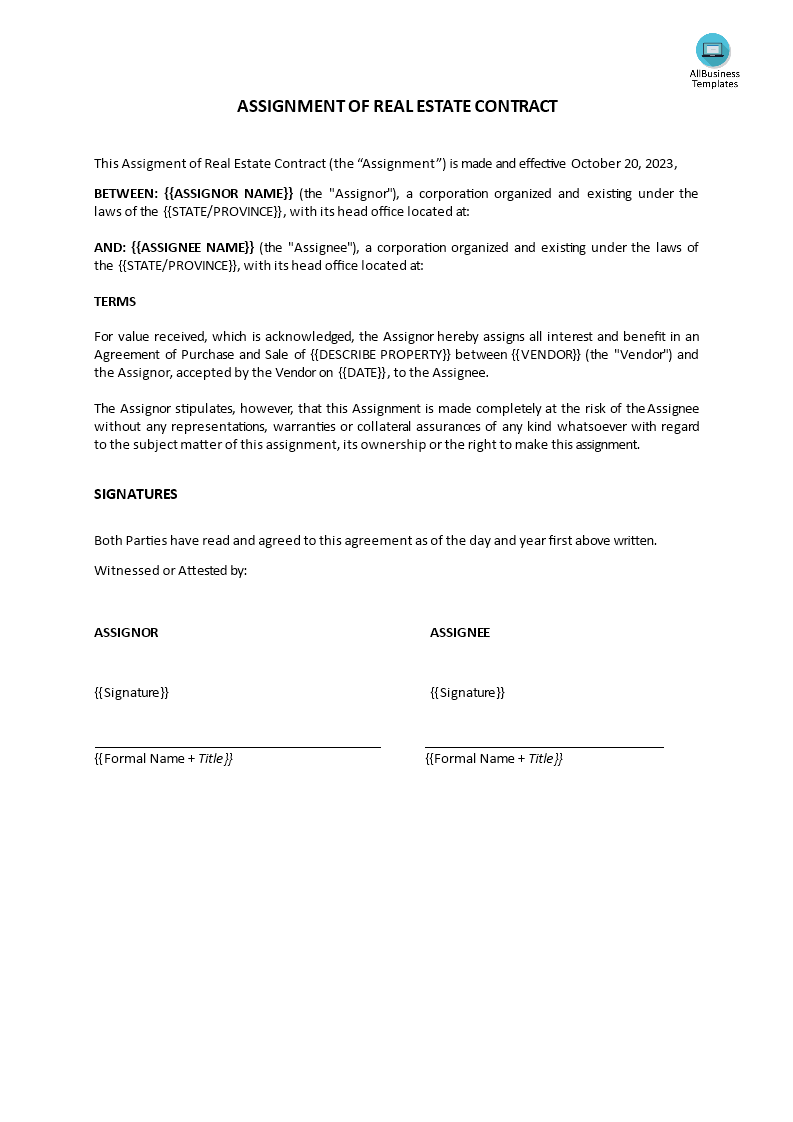Overdracht van Vastgoed contract

Opslaan, invullen, afdrukken, klaar!
De beste manier om een Overdracht van Vastgoed contract te maken? Check direct dit professionele Overdracht van Vastgoed contract template!
Vandaag: USD 2.99
Download nu!

Beschikbare bestandsformaten:
.docx- Gevalideerd door een professional
- 100% aanpasbaar
- Taal: English
- Digitale download (24.12 kB)
- Na betaling ontvangt u direct de download link
- We raden aan dit bestand op uw computer te downloaden.
Wettelijk opdracht onroerend goed Onroerend goed
How to write a real estate assignment or a real estate contract? What is the meaning of assigning a contract? We have got you covered. Our template is comprehensive and easy to use. You can download it instantly and start using it right away.
An Assignment of Real Estate Contract is a legal document used in real estate transactions when one party to an existing real estate contract (the "assignor") transfers their rights and obligations under that contract to another party (the "assignee"). This assignment allows the assignee to step into the shoes of the assignor and assume the role of the buyer or seller in the real estate transaction.
Here's a breakdown of the key elements and considerations related to an Assignment of Real Estate Contract:
- Original Real Estate Contract: Before an assignment can occur, there must be an existing and valid real estate contract in place. This contract typically outlines the terms and conditions of the real estate transaction, including the property's description, purchase price, closing date, and other essential details.
- Assignor: The assignor is the party who currently holds the rights and obligations as either the buyer or seller under the original real estate contract. They are the parties seeking to transfer these rights and obligations to the assignee.
- Assignee: The assignee is the party to whom the rights and obligations of the assignor are being transferred. By accepting the assignment, the assignee effectively takes over the role of the buyer or seller in the real estate transaction.
- Assignment Agreement: The Assignment of Real Estate Contract is a separate legal contract that formalizes the transfer of rights and obligations from the assignor to the assignee. This agreement includes specific details about the assignment, such as the names and contact information of the parties, a description of the original real estate contract, and the rights and obligations being transferred.
- Consent: Many real estate contracts contain provisions that require the consent of the other party (the non-assigning party) before an assignment can occur. The Assignment Agreement may include a clause specifying the need for the non-assigning party's consent and outlining the process for obtaining it.
- Notice: The assignor often provides written notice to the non-assigning party, informing them of the assignment and providing the contact information of the assignee. This notice ensures transparency and allows the non-assigning party to communicate with the new party involved in the transaction.
- Liabilities and Obligations: The Assignment Agreement typically specifies that the assignor remains liable for any breaches or obligations under the original real estate contract unless there is an agreement stating otherwise. This means that if the assignee fails to perform, the assignor may still be held responsible.
- Closing and Settlement: The agreement may address how the closing and settlement process will occur, including the transfer of funds, the conveyance of property title, and any necessary documentation.
- Fees and Consideration: Any fees or considerations related to the assignment, such as assignment fees or deposits, may be outlined in the agreement.
- Governing Law: The agreement may specify the jurisdiction and governing law that will apply to any disputes arising from the assignment.
- Signatures: The Assignment Agreement must be signed by both the assignor and assignee to make it legally binding.
Assignment of real estate contracts is a common practice in real estate transactions, particularly in situations where the original buyer or seller wishes to transfer their rights and responsibilities to another party, such as an investor or a family member.
Download this professional legal
Real Estate Assignment of Real Estate Contract template if you find yourself in this situation and save
yourself time, and effort and probably reduce some of the lawyer fees! Using our
legal templates will help you reach the next level of success in your
education, work, and business! However, we still recommend you to consider
consulting a local law firm in case of doubt to support you in this matter.
DISCLAIMER
Hoewel all content met de grootste zorg is gecreërd, kan niets op deze pagina direct worden aangenomen als juridisch advies, noch is er een advocaat-client relatie van toepassing.
Laat een antwoord achter. Als u nog vragen of opmerkingen hebt, kunt u deze hieronder plaatsen.


